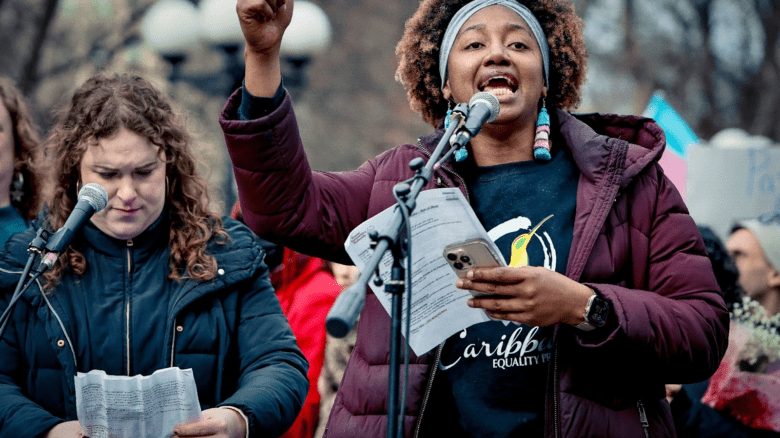Alejandro Romero Cigarroa and Emmanuel Romero Cázares weren’t expecting to attract national attention when they went to their local civil registry office in Puebla, Mexico, to get married. They had planned the date meticulously. They booked a hotel salon for a reception following the civil ceremony, their families had travelled into the city from different regions of Mexico, the couple had even managed to obtain a blessing of their rings from a local Catholic priest who told them God loved them no matter who they loved.
In the weeks leading up to the big date, they’d visited the registry office multiple times to ensure that they had all their paperwork in order. But when they arrived for their planned wedding on April 28, 2022, the local judge told them it would be impossible for them to marry. Her reason: the civil code of the state of Puebla forbade anyone from getting married if they carry a hereditary or contagious disease. Cázares and Cigarroa are both HIV-positive, as they had indicated on mandatory health forms submitted to the register.
“I started crying because I was so upset,” Cigarroa says. “We had planned this whole wedding, my family was there. This judge tried to tell me not to cry, you’re so handsome, like she was mocking us and our situation. Emmanuel was really mad, and I told him that maybe we should go to Mexico City to get married because this wouldn’t happen there.”
Puebla wasn’t alone in barring people living with HIV from getting married. Nine other states across Mexico still have laws barring people living with HIV from getting married: Chiapas, Durango, Guanajuato, Guerrero, Nuevo León, Oaxaca, Querétaro, Quintana Roo and Sinaloa. In several other states, people with HIV can only get married if their partner signs a document swearing that they are aware of their partner’s serostatus, while in others, the marriage rights of people living with HIV are entirely at the whim of local judges.
When HIV first hit Mexico in the 1980s, fear of the virus drove state governments to pass a raft of laws they thought would help contain the spread of the disease. Laws were introduced criminalizing the spread of “contagion,” and under the same logic, many states passed laws barring people living with “contagious” or “infectious” diseases from getting married.
When couples want to get married in Mexico, they’re required to submit lab work documenting their health and serostatus to the civil registry in more than half of all states.
These laws create complications for couples where one or both partners have HIV, says Ninde MolRe, an activist from México Igualitario, the LGBTQ2S+ advocacy group that made its name fighting to achieve the right to same-sex marriage across Mexico.
“Because of stigma, many of them prefer not to get married, or to have the tests done in labs where they can pay to hide the information,” MolRe says. “Of course, if the authorities knew the lab gave that [false test], they would have consequences, and for the couple too because they [would have] committed a crime. And later if the couple want to split, and if someone wants revenge, they can go to the authorities and start prosecution [alleging their partner exposed them to HIV].”
MolRe says México Igualitario has been lobbying state governments to change these laws and provided legal support to couples—both opposite- and same-sex—who are denied access to marriage because of their serostatus.
Barring people living with HIV from marriage can be counterproductive to fighting the spread of the virus, MolRe says. Marriage can improve people’s access to health insurance, for example, if one spouse has better access to insurance through work, which improves access to effective treatment. Barring access to marriage also bolsters stigma against people living with HIV, she feels, which discourages testing and treatment needed to reduce the spread of infection.
Marriage also provides people living with HIV with a number of practical and social benefits, for example, around medical decisions, hospital visitations and pensions.
Although Mexico has relatively low rates of HIV, stigma against people living with the virus is persistent. That stigma hampers efforts to stop the spread of the virus, MolRe says.
The government provides PrEP, medication that significantly reduces a person’s chance of transmitting or contracting HIV, for free at clinics in major cities.
“If you go to hospitals outside of Mexico City, you can get PrEP for free, but if you do, you can face stigma,” she says.
The stigma against the virus also explains why these laws have persisted despite falling infection rates, and the growing understanding that HIV can be controlled with proper treatment.
Cázares and Cigarroa had at least some help on their side. When they were turned away from the civil registry office, they were able to contact a lawyer immediately through México Igualitario. They were also supported by an officer from the state human rights commission, who tried to explain to the judge that blocking their marriage was a violation of their rights to equal treatment.
While those efforts were unsuccessful in getting them married that day, Cázares and Cigarroa were able to file a suit in federal court seeking an order to allow them to marry. By the end of the day, they had also been in contact with a friend who publishes a local news magazine, who reported on their story. Soon, they were making headlines in national newspapers and were the object of a national debate about the rights of people living with HIV.
“We wanted to make sure that the community is aware about what happened and that this could happen to anyone,” Cázares says. “When the magazine put out the news, other magazines and newspapers wanted to interview us.”

“Since we went public, many couples from different parts of Mexico started to write to us on social media networks, that they were really appreciating what we did, and that they suffered the same, but they didn’t fight because they were afraid.
“It makes us feel that it’s valuable what we’re doing.”
But of course, the feedback wasn’t all positive. Becoming among the most visible faces of HIV in Mexico attracted a lot of disturbing reactions.
“It was really cruel,” Cigarroa says. “Many of the comments in the media were cheering us, but others were violent, threatening us with death. Before all of this happened, we were a really public couple, but now I’m really paranoid, because I don’t know if someone is watching us, and knowing we’re a gay couple with HIV.”
Months later, a federal court ruled that denying them access to marriage was unconstitutional and ordered the Puebla court to marry them. The couple are now awaiting a decision seeking damages for the costs they incurred for the cancelled wedding, plus additional damages for their loss of dignity and the discrimination and threats they’ve suffered as a result of their story becoming national news. They’ve decided to wait to get married until after a final decision is made regarding costs.
“We want to show that there are consequences when you deny people their rights,” Cigarroa says.
But the court ruling wasn’t the end of the story. Under Mexico’s legal system, a finding of unconstitutionality doesn’t necessarily render a law struck down; it only creates a limited injunction allowing the plaintiffs to ignore it. So, although Cázares and Cigarroa could get married whenever they want, the same wouldn’t be true for other people living with HIV until the state formally changes the law.
Cázares and Cigarroa’s story may have finally begun to move the needle on the public’s perception of HIV, however. Bolstered by several court rulings, the National Human Rights Commission put out an open letter this spring to the 10 state governments that had marriage bans, calling on them to repeal those laws.
In a surprising turn, the Puebla state congress was the first to respond by amending its marriage laws in July 2023, clarifying that people with an infectious disease may marry as long as their partner says in writing that they are aware of it.
“We are so happy about this, and we believe that our case made enough impact to make this possible,” Cázares says. “We hope that with this modification of the law, no more couples experience HIV discrimination.”
Other states are debating repealing their laws as well, although conservative legislators are throwing up resistance.
MolRe says México Igualitario also wants all laws that stigmatize people living with HIV repealed nationwide, including laws that criminalize HIV transmission. In March, Nayarit became the latest state to decriminalize HIV transmission, joining just four other states that have repealed HIV transmission laws.
While momentum is on the side of equality for people living with HIV in Mexico, there remains a long way to go to strip discrimination out of the country’s laws.


 Why you can trust Xtra
Why you can trust Xtra


